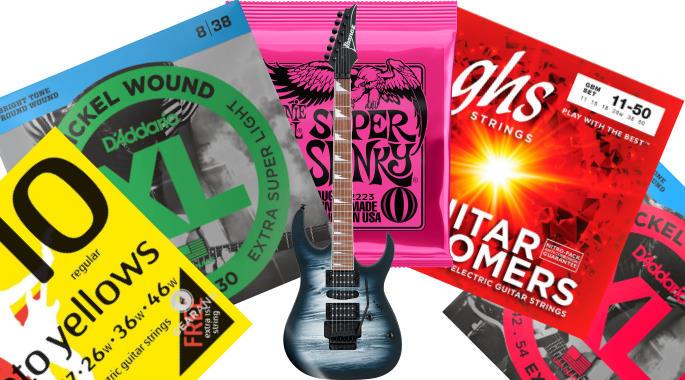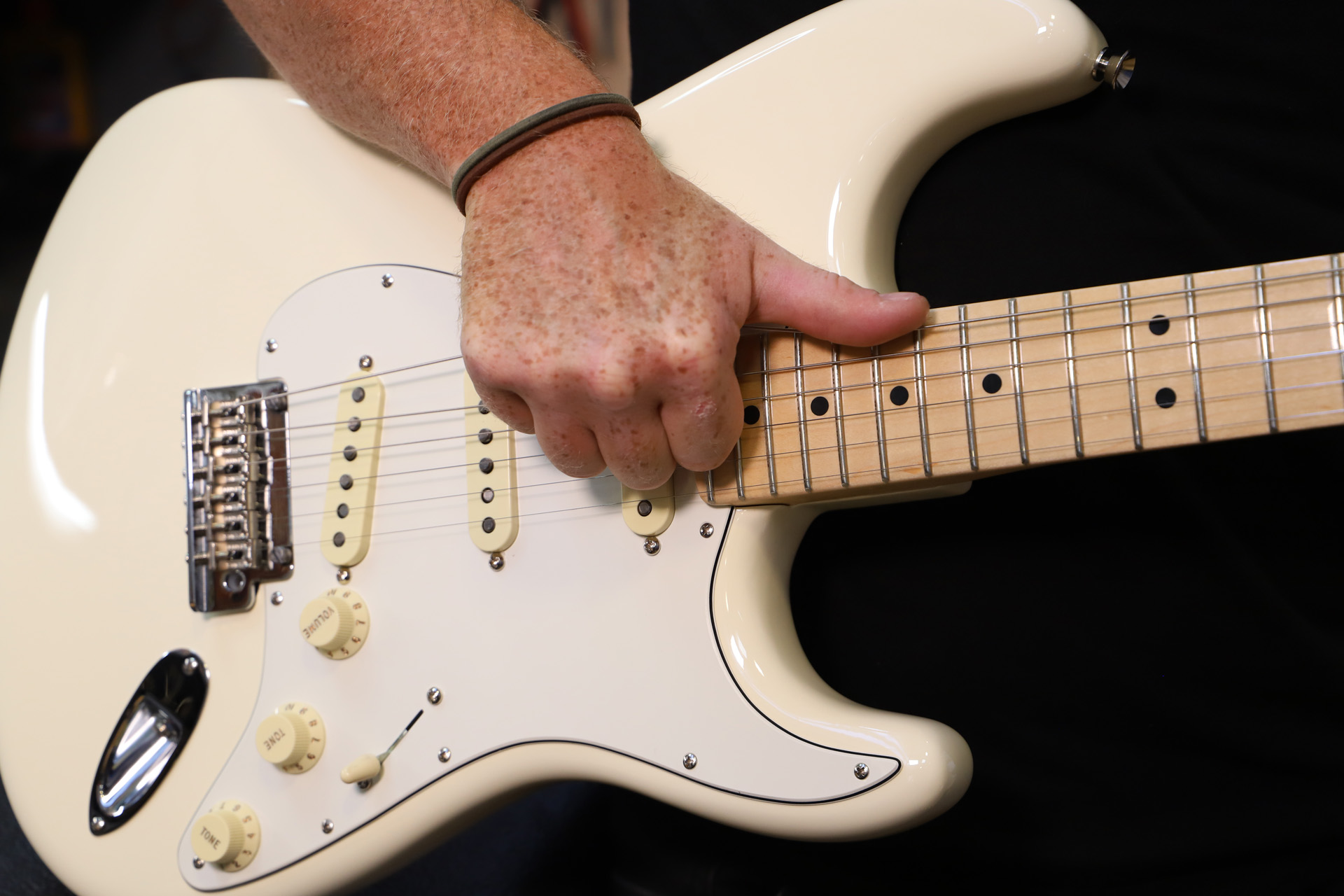Good electric guitar strings provide durability and rich tone quality. Popular choices include nickel-plated, stainless steel, and pure nickel strings.
Selecting the right electric guitar strings can elevate your playing experience and bring out the best in your instrument. Quality strings resonate with clarity and sustain, allowing both novices and seasoned musicians to produce excellent sound. Diverse music styles often require different types of strings, so it’s crucial to choose according to your genre preference.
Nickel-plated strings are revered for their balanced sound, making them a versatile option for various music types. Stainless steel strings offer a brighter tone and resist corrosion, while pure nickel strings deliver a warm, vintage sound favored by many professional players. Proper string choice contributes significantly to playing comfort and the overall health of your guitar, affecting playability and tuning stability. Ensuring your electric guitar is strung with the best strings not only aids your performance but also enhances your practice and recording sessions.

Credit: www.gearank.com
Introduction To Electric Guitar Strings
Striking a chord on your electric guitar not only resonates through the wood but also through the very soul of the instrument – the strings. While often overlooked, electric guitar strings play a pivotal role in shaping the sound, feel, and overall playability of your guitar. The journey to find the perfect set of strings can be transformative, elevating your playing experience and bringing a newfound clarity and presence to your music.
The Importance Of Choosing The Right Strings
Every guitarist’s quest for tone perfection starts with the strings. Selecting the right strings is essential as they are the primary contact points for both fingers and pick, dictating the ease with which each note is played and the quality of the sound produced. Whether you prefer searing solos or crunchy chords, the right strings can make all the difference, unlocking the full potential of your electric guitar.
Understanding The Basics: Gauge, Material, And Coating
Before diving into the vast sea of string options, let’s understand the fundamentals:
- Gauge: This refers to the thickness of the strings. It ranges from light to heavy, affecting both playability and tone.
- Material: Strings are made from various materials, each imparting a distinct sonic character. Popular materials include nickel-plated steel, pure nickel, stainless steel, and cobalt.
- Coating: Some strings come with a protective coating that extends their life by resisting corrosion, but it can also slightly alter the feel and tonal properties.
Now that you’re armed with the basics, you’ll be better equipped to navigate the nuances each string set offers and find your ideal match.
How Strings Affect Tone And Playability
The strings on your electric guitar contribute significantly to both the instrument’s tone and playability. Thicker gauges generally yield a fuller, warmer sound with more sustain, as opposed to lighter gauges that offer ease of bending and a brighter attack. The materials and coatings influence the texture of strings against your fingertips, the string’s resonance, and its response to magnetic pickups. Thus, personal preference and playing style are key considerations when choosing your strings, as they color your musical canvas in unique and expressive ways.
Types Of Electric Guitar Strings
Choosing the perfect set of electric guitar strings can be pivotal to achieving your desired sound and feel. Guitar strings come in various materials and coatings, each offering a unique tonal palette and playing experience. Whether you’re shredding solos or strumming chords, understanding the different types of electric guitar strings will help you find the perfect match for your playing style and tone preferences.
Nickel-plated Strings: The Standard Choice
Nickel-plated strings are widely regarded as the industry standard, revered for their balanced sound. This go-to option for numerous guitarists blends a steel core with a nickel-plated exterior, providing a combination of playability and dynamic sound that suits a diverse range of playing styles. Ideal for those seeking versatility, these strings offer:
- A smooth playing feel that’s gentle on your fingers.
- A balanced tone with both brightness and warmth, suitable for many genres.
- Reliable durability that withstands regular playing.
Stainless Steel Strings: For Brightness And Durability
Stainless steel strings stand out due to their crisp and articulate tone. Favored by players in search of clarity and longevity, these strings deliver a bright sound and are highly resistant to corrosion. The benefits include:
- A pronounced top-end, giving your notes a sharp attack.
- Exceptional resistance to tarnishing, keeping them fresh for longer.
- Their resilient nature makes them ideal for bending and heavy playing.
Pure Nickel Strings: Warmth And Vintage Vibe
Pure nickel strings, reminiscent of the classic strings from the golden era of rock, exude a warm, smooth sound. They are the go-to for players chasing that nostalgic tone. Here’s what sets them apart:
- A rich, full-bodied tone that captures the essence of vintage guitars.
- Less bite than their nickel-plated cousins, offering a mellower sound.
- Often preferred for blues, jazz, and classic rock genres.
Coated Strings: Extended Lifespan And Consistent Tone
Coated strings come with a micro-thin layer of protective coating, which shields them from the elements that contribute to wear and tear. These strings are particularly beneficial for players who want a long-lasting string without frequent changes. They provide:
- A protective barrier against sweat, oils, and dirt.
- A consistent tone that remains stable over time.
- A slightly different feel that some players prefer for its smoothness.
When selecting electric guitar strings, consider the tonal qualities and the feel under your fingers. Think about the music you play and the sound you’re after. Each type of string offers something distinct, so explore the options and find the set that resonates with your personal style and tone.
Selecting The Best Strings For Your Playing Style
Every electric guitarist knows that the type of strings you use can profoundly affect your sound and playability. Whether you’re shredding solos or strumming chords, selecting the ideal strings is crucial for achieving your desired tone and feel. In this post, we’ll guide you through finding the best electric guitar strings tailored to your playing style.
Identifying Your Tone Goals: Bright Vs. Warm
The quest for the perfect tone starts with understanding what sound you’re after. Electric guitar strings can greatly influence whether your guitar sounds bright and cutting or warm and mellow.
- Bright Tones: If you’re seeking clarity and presence, especially for genres like rock, metal, or country, look toward strings made with materials like stainless steel or nickel-plated steel.
- Warm Tones: Jazz and blues players often prefer a smoother, warmer tone, which can be achieved with pure nickel or chrome strings.
Gauge Matters: Finding Your Ideal String Thickness
String gauge, or thickness, has a substantial impact on playability and sound. Thicker strings, known as heavy gauges, provide more volume and sustain but require more finger strength. Conversely, lighter gauges are easier to play and bend but may produce less volume.
| Gauge | Typical Use |
|---|---|
| Extra Light | Lead guitar, easy bending |
| Medium | Rhythm guitar, balanced feel |
| Heavy | Blues, jazz, strong output |
Exploring String Brands And Artist Endorsements
Not all strings are created equal, and the market is flooded with options. Well-known brands like Ernie Ball, D’Addario, and Elixir have all earned their reputations through consistent quality and artist endorsements. Research and experimentation are key to determining which brand aligns with your needs.
- Ernie Ball: Favoured by rock and metal guitarists for their Slinky series.
- D’Addario: Known for their balanced tone and extended lifespan.
- Elixir: Popular for their coated strings that resist corrosion.
Changing Strings And Maintenance For Optimal Performance
Your strings’ longevity and performance hinge on regular maintenance. Changing strings and cleaning your guitar regularly prevents corrosion and preserves tone. Each player’s frequency of change will vary based on play style, sweat acidity, and environmental factors.
- Clean your strings after every session to extend their life.
- Store your guitar in a stable environment, away from extreme temperatures and humidity.
- Change strings every 3 to 4 months or sooner if you notice tone degradation or intonation issues.

Credit: www.sweetwater.com
Tips And Recommendations
Choosing the right electric guitar strings can significantly influence your playing experience and sound quality. Whether you’re a novice or a seasoned professional, understanding the nuances of string types and knowing when to replace them is crucial. Follow these tailored tips and recommendations, and you’re sure to notice an enhancement in your guitar’s performance.
Popular Brands And Series: What Are Professionals Playing
Professional guitarists often have preferred string brands and series that they rely on for consistency, durability, and tone. Here are some popular choices:
- Ernie Ball Slinky – Widely loved for their balanced tone and comfortable playability.
- D’Addario XL – Known for their bright sound and excellent intonation.
- Elixir Nanoweb – These have a special coating for extended life and a smooth feel.
- GHS Boomers – Offers a powerful tone with a professional level of performance.
Each brand offers unique qualities that could be the perfect match for your style. Test different sets to discover which strings make your guitar sing.
When To Change Your Strings: Signs Of Wear And Tear
Your guitar strings won’t last forever. Lookout for these clear indicators that it’s time for a change:
- Dull or flat tone lacking brightness or resonance.
- Visible corrosion, rust, or discoloration on the strings.
- Difficulty staying in tune, pointing towards compromised string integrity.
- A decrease in playability or increased finger discomfort.
Regular players might find themselves changing strings as often as once a month, while less frequent players might change every 3-4 months. Listening to your guitar and being aware of these signs will keep your tone fresh and lively.
Customizing String Sets For Personalized Feel And Sound
Customizing your string set can propel your playing to new heights. Experiment with:
- Different gauge combinations for comfort and playability.
- Hybrid sets that offer light top strings for easy bending and heavier bottom strings for a fuller rhythm tone.
- Varying materials like nickel, stainless steel, or cobalt for distinct tonal qualities.
Always remember: Personal preference plays a significant role in your choice. Adjust your strings to find the optimal blend that resonates best with your playing style and guitar type.
Resources For Further Learning And Expert Advice
To deepen your knowledge of electric guitar strings, these resources can be invaluable:
- Online forums and communities such as Ultimate Guitar or The Gear Page.
- Reviews and tutorials on YouTube channels like Anderton’s Music Co or JustinGuitar.
- Music store professionals who can offer personalized recommendations.
- Books like “The Guitarist’s Guide to Strings and Accessories” by Mick Gorbett.
Combining these resources with real-world experimentation will enhance your understanding and ensure you make informed decisions about your gear.

Credit: producelikeapro.com
Do Different Types of Electric Guitar Strings Affect Sound Quality?
The choice of electric guitar strings can significantly shape your sound. Different materials, gauges, and coatings alter tone and resonance. Musicians often debate how the electric guitar string impact varies between styles, highlighting preferences for brighter or warmer tones. Ultimately, the right strings can elevate your performance.
Frequently Asked Questions Of What Are Good Electric Guitar Strings
What Are The Best Electric Guitar Strings To Use?
The best electric guitar strings vary based on your style; Ernie Ball Regular Slinky, D’Addario EXL110-3D, and Elixir Optiweb are popular choices for their durability, tone, and playability. Choose gauges and materials that match your personal preference and playing genre.
What Strings Do I Need For Electric Guitar?
Electric guitar strings come in various materials like nickel-plated steel or pure nickel, and gauges from light to heavy. Nickel-plated steel strings provide a balanced tone, while pure nickel strings give a warmer sound. Choose gauges based on your play style and tone preference.
Does It Matter What Electric Guitar Strings You Get?
Yes, the choice of electric guitar strings affects playability, tone, and overall performance. Different gauges and materials suit various playing styles and musical genres.
Which Guitar String Is Best?
The best guitar string depends on your playing style and tone preference. Acoustic players often prefer phosphor bronze for warmth, while electric guitarists may choose nickel-plated steel for versatility. Nylon strings are ideal for classical music. Always choose quality brands for durability and consistent sound.
Conclusion
Selecting the right electric guitar strings is vital for both sound and playability. The best choice varies, influenced by personal style and guitar type. Research, quality, and material matter. Remember, experimenting can lead to your ideal set. Embrace the journey towards perfecting your unique sound.
